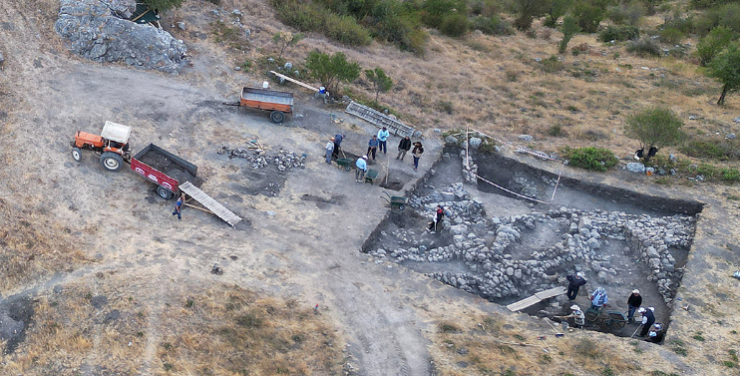It was reported that a new Indo-European language was discovered during excavations in the Boğazkale district of Çorum, the capital of the Hittites, Hattusa, which is on the UNESCO World Cultural Heritage list.
Boğazköy-Hattusha in the northern part of Central Anatolia is home to the capital of the Hittite Empire, one of the greatest powers of the Near East Late Bronze Age.
In Hattusa, where excavations have been ongoing for more than 100 years with Turkish archaeologists, approximately 30 thousand clay tablets written in cuneiform script have been found so far. Registered as part of the UNESCO Memory of the World List since 2001, these tablets offer a wealth of information about the history, society, economy and most importantly, religious traditions of the Hittites and their neighbors.
In the statement of Çorum Provincial Directorate of Culture and Tourism, it was said that new cuneiform finds continue to be added to the finds in the archaeological works carried out under the direction of Prof. Dr. Andreas Schachner from the German Archaeological Institute Istanbul Branch.
“Most of the texts are written in Hittite, the oldest proven Indo-European language and the dominant language in the region, but this year’s excavations yielded an unexpected surprise. Hidden inside a cult ritual text written in Hittite was a reading text written in a hitherto unknown language.” The excavation epigraphist, Prof. Dr. Daniel Schwemer of the University of Würzburg in Germany, identified this language as the language of the country of Kalaşma, located on the northwestern edge of the Hittite central region, probably in the modern Bolu or Gerede region.
Hittites were interested in foreign languages
The discovery of another language in the Boğazköy-Hattusha archives is not entirely unexpected. According to Prof. Schwemer, the Hittites were interested in recording rituals in foreign languages. The ritual texts written by the Hittite king’s scribes reflect the diverse Anatolian, Syrian and Mesopotamian traditions and linguistic environments. They offer valuable insights into the little known linguistic geography of Late Bronze Age Anatolia, where not only Hittite was spoken. Indeed, the cuneiform texts from Boğazköy-Hattusha include two other Anatolian-Indo-European languages closely related to Hittite, Luwian and Palaca, as well as a non-Indo-European language, Hattian. Kalashma is now being added to these.
The text in the newly discovered Kalashma language is still largely unintelligible.
Prof. Elisabeth Rieken, an expert on ancient Anatolian languages, confirmed that this new language belongs to the Anatolian-Indo-European family of languages. According to Rieken, despite its geographical proximity to the region where Palaic was spoken, this text seems to share more linguistic features with Luwian. How closely Kalashma is related to other Luwian dialects in Late Bronze Age Anatolia will be the subject of further research.
Cover Photo: At this excavation site at Boğazköy-Hattusha in Türkiye, a cuneiform tablet containing a previously unknown Indo-European language was discovered. Andreas Schachner / Deutsches Archäologisches Institut
